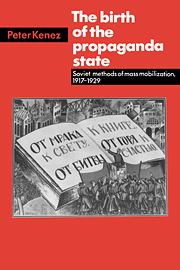Book contents
- Frontmatter
- Contents
- List of illustrations
- Preface
- Introduction: The Soviet concept of propaganda
- Part I The Civil War
- 1 The press
- 2 The struggle for the peasants
- 3 Liquidating illiteracy in revolutionary Russia
- 4 The Komsomol in the Civil War
- 5 The political use of books, films, and posters
- Part II The new economic policies
- Conclusion and epilogue
- Notes
- Glossary
- Bibliography
- Index
3 - Liquidating illiteracy in revolutionary Russia
Published online by Cambridge University Press: 02 December 2009
- Frontmatter
- Contents
- List of illustrations
- Preface
- Introduction: The Soviet concept of propaganda
- Part I The Civil War
- 1 The press
- 2 The struggle for the peasants
- 3 Liquidating illiteracy in revolutionary Russia
- 4 The Komsomol in the Civil War
- 5 The political use of books, films, and posters
- Part II The new economic policies
- Conclusion and epilogue
- Notes
- Glossary
- Bibliography
- Index
Summary
Lenin, the Marxist, was deeply preoccupied with the question: Was Russia ready for the Revolution? He could not lightly dismiss Menshevik criticisms according to which the economy and society had not yet properly developed. Obviously he ultimately rejected these objections and rejected them passionately; but at the same time, he was deeply aware of the backwardness of the country. His solution in principle was simple: While fighting a life-and-death struggle against their opponents, the Bolsheviks at the same time had to raise the cultural level of the people. Consequently, Lenin, the supreme realist, chose “cultural revolution” as one of the major themes of his writings during the last years of his life.
Where Lenin and his comrades spoke and wrote about “culture,” they rarely had in mind mankind's highest creative and artistic achievements. For them culture was the opposite of backwardness, a combination of a certain economic well-being, industrial and technical accomplishments, modern attitudes to the problems of existence, and certain very basic intellectual accomplishments. It is in this context that we must place Lenin's famous preoccupation with electrification and understand such striking statements as “Socialism without postal and telegraph service is the emptiest of phrases”; and, of course, it is in this context that we can understand the remarkable literacy drive undertaken by the young Soviet republic.
The early history of the literacy drive deserves study for three reasons. First, it reveals a great deal about the mentality of the Bolshevik leaders and about their perception of the task of the revolutionary transformation of society.
- Type
- Chapter
- Information
- The Birth of the Propaganda StateSoviet Methods of Mass Mobilization, 1917-1929, pp. 70 - 83Publisher: Cambridge University PressPrint publication year: 1985



